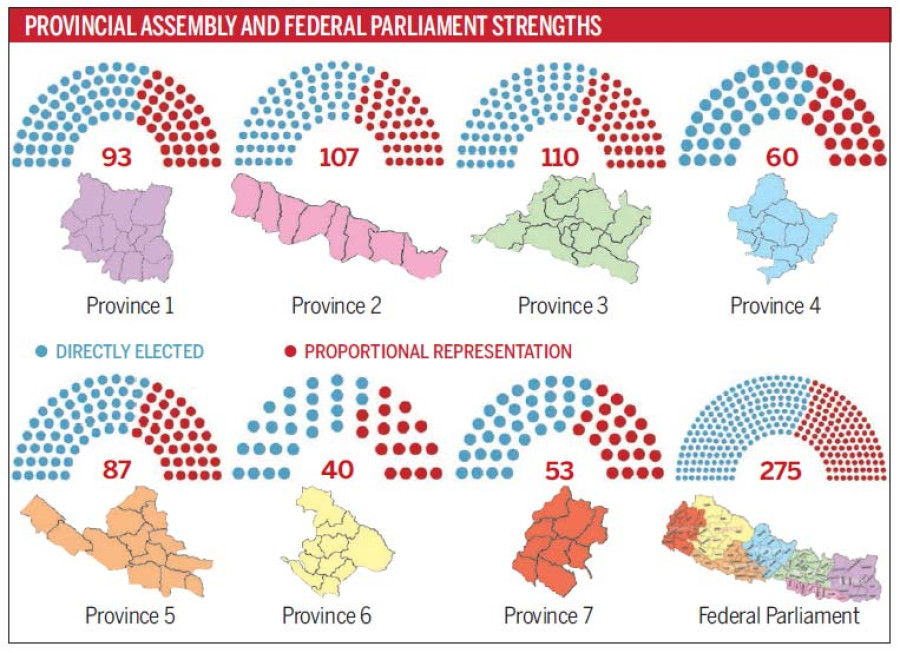National
RJP-N takes exception to new constituencies
The Rastriya Janata Party-Nepal (RJP-N) has lodged a protest with Prime Minister Sher Bahadur Deuba, saying the Constituency Delimitation Commission (CDC) has reduced the representation of Madhes while carving out electoral constituencies.
Tika R Pradhan
The Rastriya Janata Party-Nepal (RJP-N) has lodged a protest with Prime Minister Sher Bahadur Deuba, saying the Constituency Delimitation Commission (CDC) has reduced the representation of Madhes while carving out electoral constituencies.
The CDC, which submitted its report to PM Deuba on Wednesday, has carved out 165 electoral constituencies for the federal elections and 330 constituencies (each federal constituency will have two provincial constituencies) for provincial assembly polls.
The elections have been called for November 26 and December 7.
The RJP-N has expressed its concern over “only 78 electoral constituencies” in 20 districts of the Tarai region.
“This act of reducing the representation of Madhes in the federal parliament is but a ploy against the RJP-N,” reads a memorandum submitted by the party to PM Deuba on Friday.
The CDC has brought down the number of constituencies from 240 to 165 and once this provision comes into force following its publication on the Nepal Gazette, this cannot be altered for another 20 years.
In the earlier set-up, 20 districts in the Tarai had 48.33 percent of 240 electoral constituencies.
As per the 2001 census, the population in these districts was 48.4 percent. In the 265-constituency set-up, 20 Tarai districts have 47.27 percent of constituencies.
RJP-N leaders are of the view that the CDC has reduced the number of constituencies along the plains “despite the fact that 51 percent of population resides in the region”.
The RJP-N, a unified force of six Madhes-based parties, has long been demanding Madhes’ representation on the basis of population.
The CDC, however, has said it gave 90 percent weightage to population and 10 percent to geography while carving out the constituencies.
“Since 51 percent of the country’s population resides in 20 districts of the Tarai as per 2011 census, the constituencies in the region must be allocated on the basis of that,” said Anil Jha, an RJP-N leader, adding that his party leaders have warned PM Deuba of withdrawing support “if he fails to amend the report at the earliest”.
The RJP leaders have also claimed that the CDC report was prepared at the behest of three major parties to “suit their interests” and keep other parties, including the RJP-N, at bay.
PM Deuba is learnt to have told the RJP-N leaders that he would hold talks with top leaders of coalition partners as soon they arrive in Kathmandu from the districts and see what can be done to address the RJP-N’ concerns.
CDC report biased against Madhes: SSF-N
KATHMANDU: The Sanghiya Samajbadi Forum-Nepal (SSF-N) has taken exception to the delimitation of constituencies by the Constituency Delimitation Commission (CDC), saying the CDC failed to prepare the report as per the spirit of the constitution. “The report has failed to balance population and geography.
Social structures have not been taken into account, while Madhesi majority areas have been split, reducing the representation of Madhesis,” said SSF-N leader Upendra Yadav. “Only 47 percent of constituencies have been allocated for 20 districts in Tarai where 51 percent of the population resides,” said Yadav. “The constituencies have been carved out in such a way that non-Madhesi groups will continue to dominate the constituencies in Madhes.” The party has also objected to constituency delimitation in Hill and mountain regions, saying the CDC has decreased the representation of indigenous nationalities living there. “The CDC worked in the interest of the Nepali Congress,” he said, demanding that the government “correct the erroneous report at the earliest”. (PR)




 9.89°C Kathmandu
9.89°C Kathmandu














